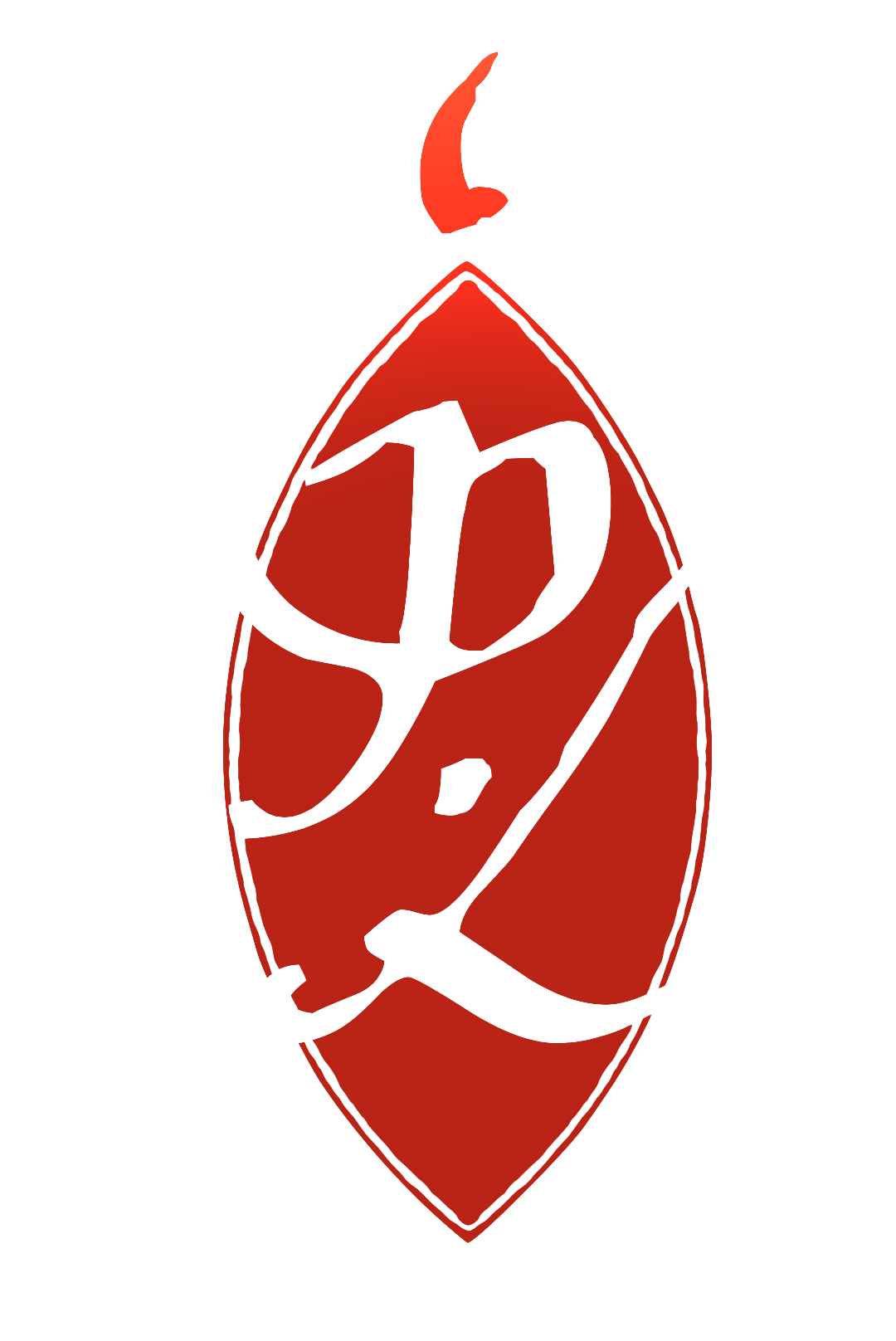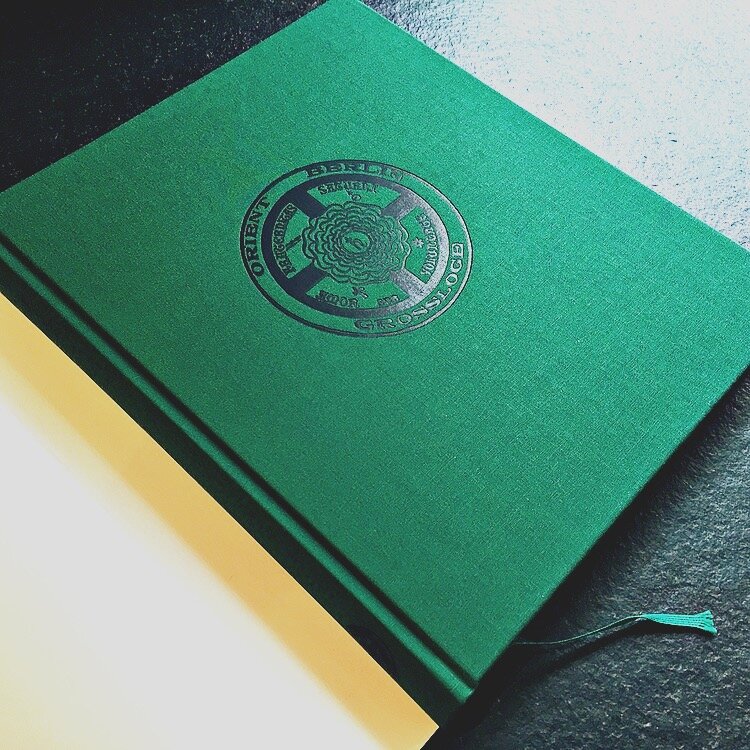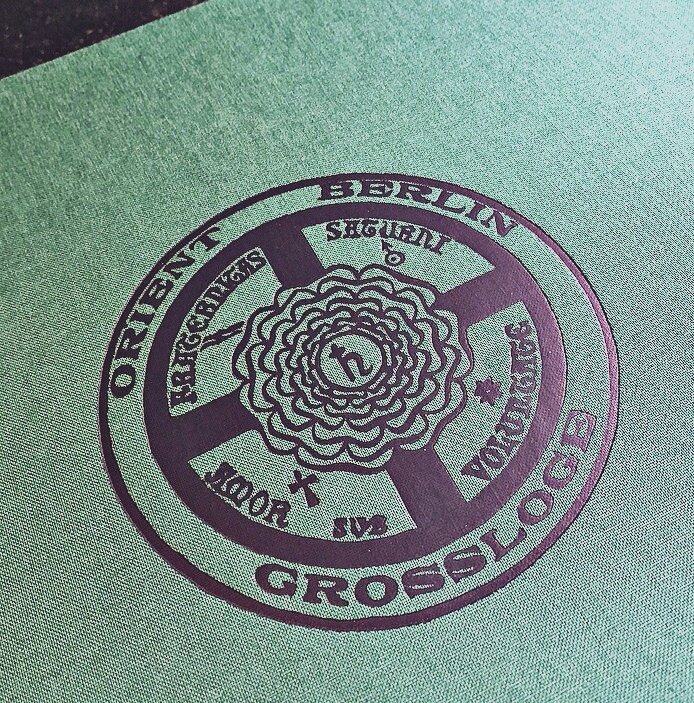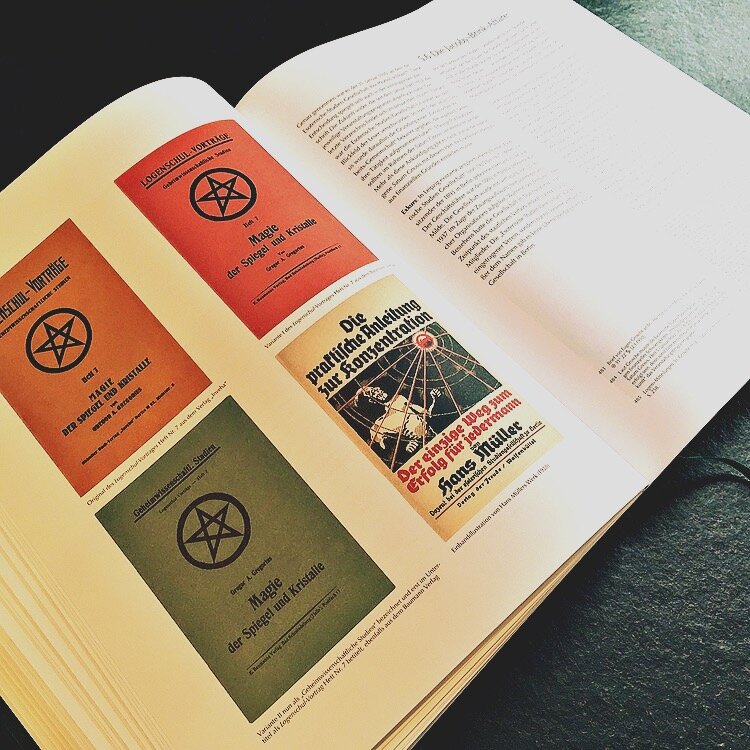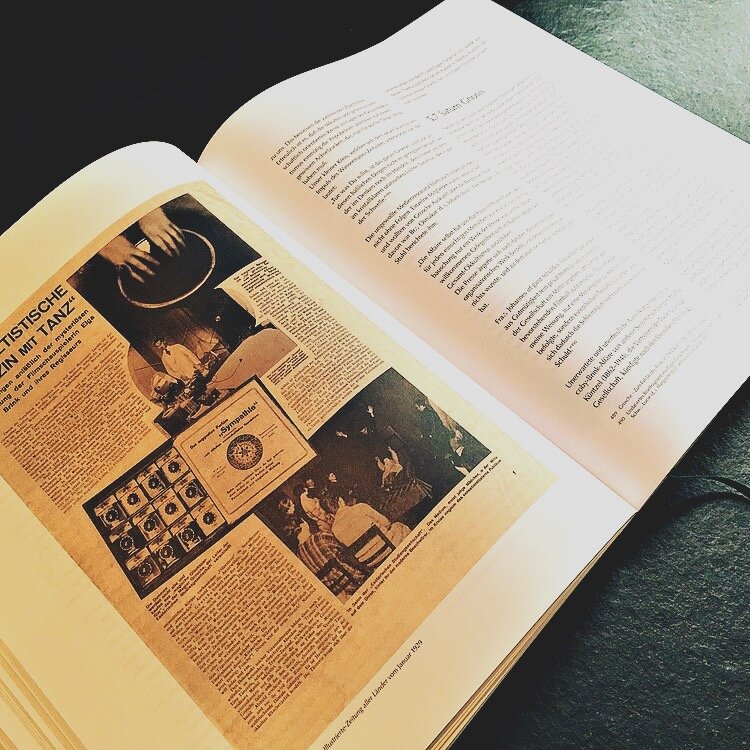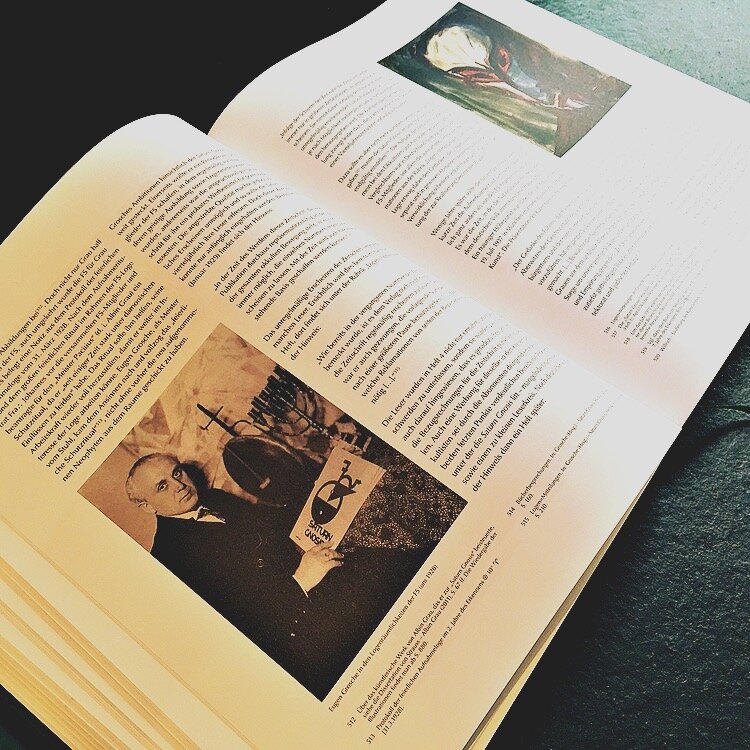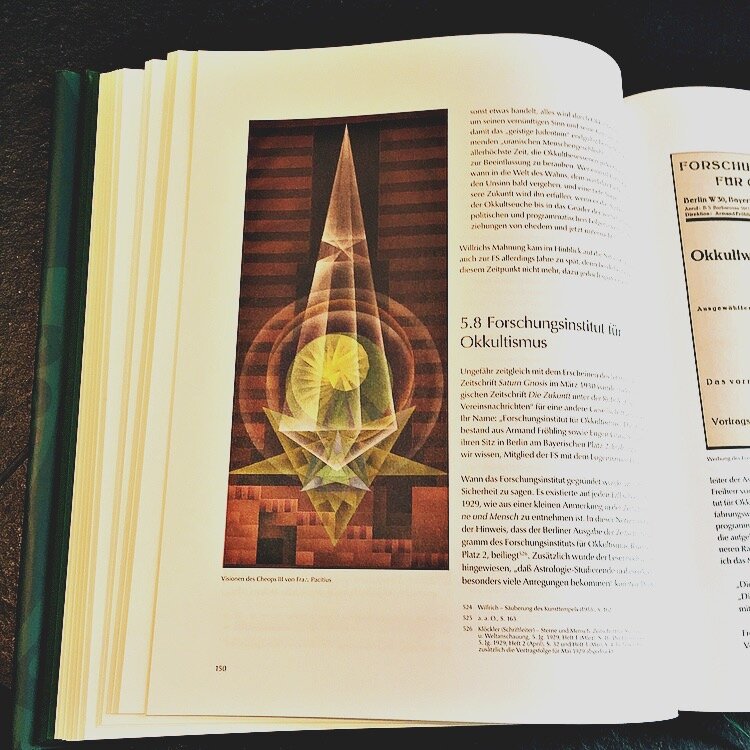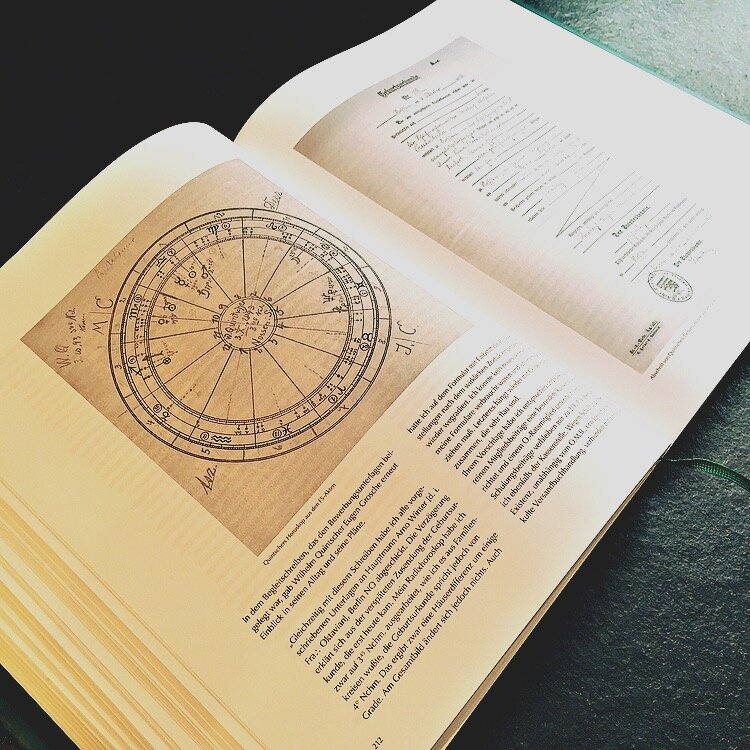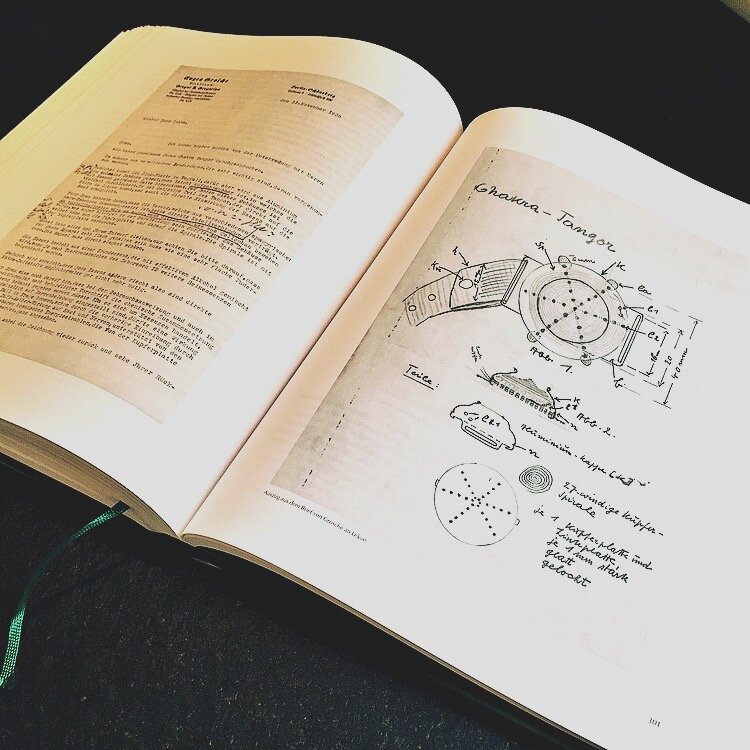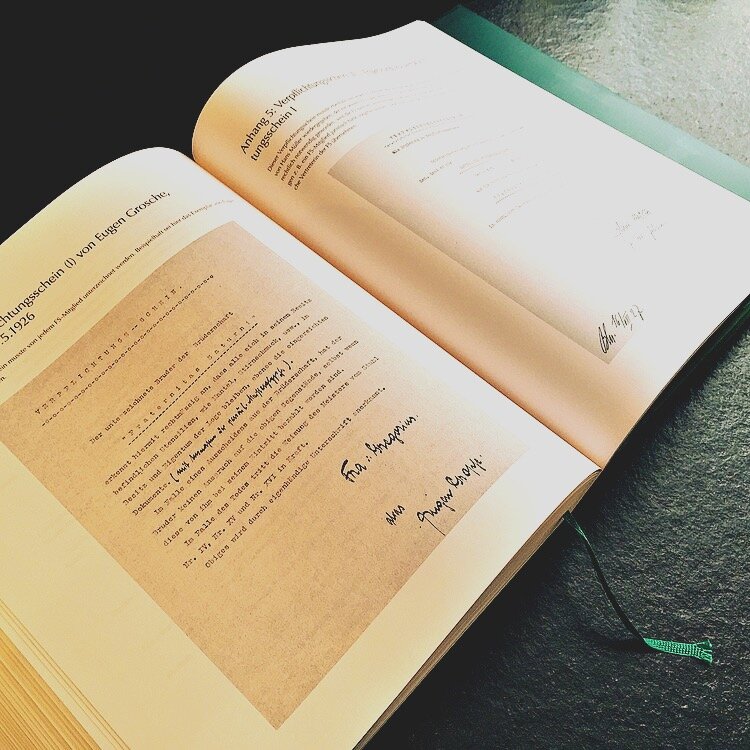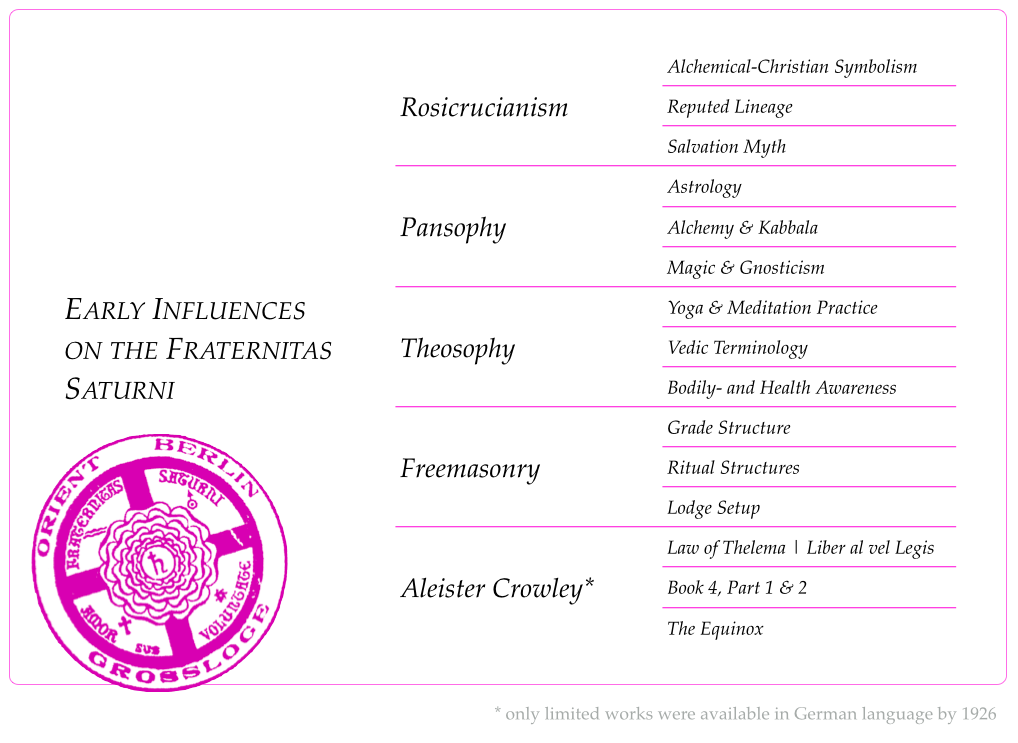‘The First Years of the Fraternitas Saturni’ by Volker Lechler
Review: Volker Lechler; Die ersten Jahre der Fraternitas Saturni, Volume 2 of Building Blocks of the Occult Lodge System Series, self-published by the author, 2015, 400 pages, 144 images, limited edition of 500 hardcover books, in German language.
by Frater Acher
Editorial note: The reviews of Volker Lechler’s critical volumes take a unique place in Paralibrum’s collection. Both tomes are available in German language only, yet provide essential new insights into several of the most influential groups in the tradition of Modern Western Magic. Frater Acher is extracting and summarising many of the books’ key insights, and thus enables English speaking readers to stay up to date with critical research findings. Rather than being classical book reviews, these articles resemble longer essays in their own right. For German speaking readers, of course, they hope to be inspiration to read Mr. Lechler’s books in the original.
Part 1
Introduction
More than a year ago I had the pleasure to review Volker Lechler’s liminal book on the founder of 20th century occult Pansophy, Heinrich Tränker. In two parts we covered some of the highlights from the newly discovered material published by Mr. Lechler. What emerged from the book was a completely new perspective on the origins of modern German-language occultism in the late 19th century. An origin that to a large extend owed more to the ancient Hermetica as well as 16th century Rosicrucians than to Medieval Grimoires or even the Golden Dawn. Magic as a central aspect of Pansophy was perceived to be a tool to advance one’s mystical enlightenment, not a path into hedonism or turning oneself into god. Unfortunately because of this, Pansophy also lacked all the grandeur and splendour that would have guaranteed it a larger and more long-living public audience - and thus remained a niche development in the German speaking countries at the turn of the 20th century. Still, it provided the fertile soil for other magical groups to rise from. And that is precisely what Mr. Lechler’s newly published 2nd volume in the series invites us to discover:
As you can see from the photos, the effort and craftsmanship that went into the physical creation of this book are just as minute as they were for the first volume: Bound in dark-green linen and stamped with the intricate design of the original lodge seal of the FS, the book speaks to the same level of loving attention to detail that we also find in Mr. Lechler's historic research. The reproduction of the countless original and extremely rare documents - most of them appearing in print for the first time - is flawless and allows to immerse the reader deeply into the time and spirit of the occult scene of the early 20th century.
Now, with the recent publication of this 2nd book in the series, let’s recall two essential learnings we took away from the first volume. Especially for a non German-speaking audience that didn’t had the pleasure to read the first book themselves. These learnings are not only applicable to our tradition of Western Magic in general, but also form a helpful backdrop for the review of the second volume in this young series:
We learned that all good work dies within the shadow of men who consider themselves more important than what they contribute to. As soon as the ego and the cause begin to blur, all inner contacts tend to withdraw. Ego as such might not kill the inner contacts but it sure bores them to death and makes them lose interest quickly - giving way to parasites and other spiritual and worldly scavengers who happily feed off the unfinished work. Keeping it stuck, open and arduous like a scar unable to heal. If this was partly true for Heinrich Tränker’s life, it became most apparent in the events that today are known as the ‘Weida conference’ and turned into a clash of egos between Tränker and Crowley. I recommend a re-read of these events in case you happened to miss them - especially as due to their importance they form the first and extended chapters of the 2nd volume.
Secondly, we learned that people who partake in any particular tradition love to look back on their predecessors and past in pride. Even if there is little to be proud of, constructing a past that fills the cracks and gaps in one’s own self-confidence seems to be a topoi, a repeating cultural pattern we humans seem to thrive on. Here we are faced with the flip-side of the saying ‘we are dwarfs standing on the shoulders of giants’. Because accepting that actually everyone was a dwarf - and our ancestors no wiser or powerful than us - is something most traditions cannot. In these cases historic and mythical past are forced to match and overlap - and the battle over orthodoxy begins. This is also what we discover in Tränker’s biography - and his life-long attempt to establish authority over the one singular version of truth, of an unbroken philosophical, mystical chain of adepts reaching far back into our collective past.
If the stories of our ancestors remain broken and unfinished, like so many of our own, we have the tendency to finish them for them. In fact, this is a wonderful service to our ancestors and has been the soil for myths over millennia. Yet, trying to control, confine and ‘purify’ this living lore, into one orthodox truth, into a single version of a story is where danger sleeps. It kills off the living spirit of our tradition, the constant renewal of our lore. Each myth we keep alive, deserves the right to change again with each mind it passes through. We leave a trace on them, just like they leave a trace on us.
Just like the previous release, Mr. Lechler’s new book on 'The First Years of the Fraternitas Saturni' will be of timeless value to future magicians and occult researchers. Without ever being judgemental or subjectively coloured in perspective the book continues to dismantle many of the myths of our tradition, which we allowed to turn cold and into false orthodoxy. The results of Mr. Lechler's painful private studies in archives all across the German speaking countries continue to break open the stone we, i.e. the German speaking tradition of magic believed to firmly rest upon. In doing so, Mr. Lechler’s second book offers a vast amount of new perspective, new interpretations and - hopefully - of new, living stories of magic to come.
A new day.
We are now in 1926. The events of the Weida conference lie behind us, few of us have actually attended but many of us have heard rumours and stories. The ‘word’ that Tränker has fallen is spreading quickly and even Crowley has left the German Reich. The *Pansophic Lodge* as we knew it is history. And right amongst its ashes, on 8th of May we have found our new home, a new occult lodge, the Fraternitas Saturni (FS).
The problem now is - speaking metaphorically - that this new home has a house number, a landlord and an address, but no roof, no windows and no foundations yet. In fact it has a table to sit on, but no food to serve yet.
Upon its founding day in 1926 the FS did not have any of the following:
a temple
any written rituals or curriculum
any structure of titles or degrees
a consistent worldview, belief or paradigm
a link to a magical past (lineage)
more than 5 members
Instead it did have:
exactly 5 members (Eugen Grosche, Max Staack, Hans Müller, Artur Schumacher, Joachim Winckelmann)
a lot of financial problems
a leader with an ego - and a plenty of talent
a desire for power and turning itself into orthodoxy
How do you make something out of nothing, is a question many alchemists have pondered over. And so did Eugen Grosche and his accomplices during spring 1926. Looking back in return, they were remarkably successful. Due to the hard and innovative inner and outer work, due to the uncompromising will a few men were able to turn into matter; and of course due to cheating where necessary like any good alchemist would have done.
As we discovered in an earlier essay, the concept of ‘cheating’ is an interesting and relatively young one in the magical tradition. If a tradition forms a chain, each link can claim genuine possession of the entire knowledge that is handed down through this chain - irrespective of who was its original creator. Each link can equally add new knowledge, as long as it remains relatively consistent with the foundational premises of the tradition. Thus knowledge begins to form a river fed by many branches. Questions over the source, or which branch added which waters, become incredibly difficult to answer. Or maybe even irrelevant? Now, such concept in itself wouldn’t pose a problem - if magical lodges in particular didn’t like to claim sovereignty over certain ‘secret’ aspects of a tradition.
With this in mind, let's take a closer look at the the origins of the Fraternitas Saturni, the influences that shaped its early theories and practices as well as the actual work it became known for early on in its existence.
The Origins.
To get us started, let’s take a brief look at the process through which the FS came to being. Looking at its predecessor lodges and groups will give us a lot of clues about where much of its original body of thought stemmed from. Take a look at the image below or download as PDF here.
I am sure if we had the opportunity to interview any of the original members of the FS each of them would have strongly disagreed with such abbreviated and possibly misleading overview. Reality always is much more complex. However, by zooming out and looking at key milestones only that led to the foundation of this storied lodge, we can see a few things with surprising clarity:
In theory Eugen Grosche (aka Gregor A. Gregorius) didn’t need to be initiated into any lodge himself in order to harvest sufficient material to create a new one. He was trained as bookseller and from young years onwards held a strong interest in the occult, even helping out in Heinrich Tränker’s specialised second-hand bookshop in Leipzig. From the turn of the 20th century newly emerging and highly dedicated publishing programs to the occult such as the famous ‘Geheime Wissenschaften’ series of the Hermann Barsdorf Verlag produced almost encyclopaedic new editions of critical works of the Western Mystery tradition for the German reader.
Even before the official formation of the FS an operating principle that Grosche would uphold for decades to come was in place: an outer study group was put in place to attract possible new members and functioned as a vestibule to the actual inner lodge. These study groups or ‘societies’ - under their various names to come - would specialise on offering open lectures and dedicated seminars to all people interested, in particular on astrology. However, these groups were not only meant to create a beacon for all people interested in the occult to see, but especially to bring in the necessary funds to make a living for their teachers.
Precisely to the last point above, we learn that from a financial point of view each attempt Grosche and his companions took to establish a source of income for themselves through the occult arts resulted in defeat. Some did so quicker, others lasted a little longer, yet none seemed to return more than they had originally invested. Despite the recurring setbacks they experienced they didn’t seem to give up or learn much from it? This is even more surprising when we see that Grosche himself gave advice to his disciplines to always remain financially independent from any occult group they might be running.
“Think it all over well, allow things to settle and clear; first you should create a civic existence for yourself in order to be financially independent of the order (- which was just a study group, note Fra. Acher). That is, as I told you before, the largest cancer-harm within your structure, and you will see that from the ruins enough bricks will remain in order to erect a new structure.” (a letter by Eugen Grosche to Wilhelm Quintscher, 1927)
Despite the fact that the active people involved in each of the precursor organisations of the FS were hardly more than a dozen, all of the latter were abandoned because of inner conflict amongst their leaders as a key factor. One could assume that we are already dealing with such a niche subject here, that people should value the benefit of an active community of like-minded fellow students above anything else (especially during the times before the dawn of the internet). Yet, this doesn’t seem to be the case. Instead, conflict of power, direction and structure seems to always turn out to be the dominant topic in the end. A characteristic that of course isn’t particular to this group of German magicians - one only needs to compare it to the history and downfall of the Golden Dawn.
The Influences.
From the above we can now paint a clearer picture of the main influences on the early FS. Grosche and its founders of course didn’t operate in a void - or ‘created something out of nothing’ - but leveraged a lot of the available occult material of their days. In their approach they would prove to be as syncretic as Crowley had been in his own works - harvesting both ancient and traditional material as well as theories and practices only just emerging in the 1920s. Following Mr. Lechler’s precise analysis of events and relationships of protagonists, here is an abbreviated overview of strong influences on the early teachings of the FS:
Now, the challenge left to Eugen Grosche as the ‘Master of the Chair’ in particular, was to create a coherent whole from this primordial soup of occult influences. After all precisely the lack of such a coherent structure - in philosophic thought and magical practice - had let to the downfall of the previous Pansophic lodge and continued to be the main point of criticism on Heinrich Tränker. Clearly Grosche had learned from the mistakes of his master. Yet the question remained: How do you tackle such a beast of a task - while at the same time running a bookshop and publishing house, managing a difficult marriage, giving occult lectures almost every other night, constantly recruiting new neophytes, leading the ceremony during the recurring meetings of the young lodge as well as answering the letters of its correspondence course members? Grosche clearly was a very busy man with very little financial means - and so the practical help of a 19 year old student came in extremely handy.
“Only gradually was the new entity - Fraternitas Saturni - brought to life and content created for it; nothing was closed and everything was in the stage of becoming. Let’s take the grade system of the lodge as an example. Initially it didn’t exist at all and Grosche didn’t hold a clear idea on how it should look like. He consulted on this matter with the just 19-year old Br… Athanor (i.e. Henrik Hunwald), who had agreed to write rituals for the higher degrees leveraging works in French.” (Lechler, p. 93)
The following chapters in Lechler’s book offer the most fascinating view on how the young lodge quickly evolved from a fluid and organic stage of becoming - full of possibilities - into a rigidly managed entity, deliberately mimicking the dusted grade system, hierarchy, terminology and even heavy-handed liturgy of an old fashioned Freemason lodge. Despite Grosche’s own communist past, few of the opportunities to create something new, different and innovative were actively leveraged. Instead the mimicking of the past and the compliance with traditional structures and approaches seemed the only way to gain broader acceptance and the stage of orthodoxy in this niche tradition ultimately. Thus the man-made aspects gained the upper hand quickly in the FS - and with it the flaws that naturally come with it.
The Work.
After so much reflection on travail and shortcomings, let’s take a look at a few aspects of the early FS years that in my eyes remain pretty impressive even today. In particular this is the unflinching commitment of its key members - and especially Eugen Grosche - to not compromise their magical agenda or purity of action. In terms going out into the public and yet aiming to 'keep things real' the early FS certainly achieved a lot.
Here is just one striking example: After many failed attempts of creating sufficient income through various occult study groups, Grosche founded the ‘Esoteric Study Society’ (Esoterische Studiengesellschaft) in 1926. Now, let’s take a look at their program of public evening talks in their early days. Remember, this is during a time when Germany had lost the First World War only eight years ago, the economy had faltered and financial prospects to make a living of anything that wasn’t essential to people’s lives were rather dark... Here are a few topics that Grosche and his peers chose to ‘introduce’ the Berlin public to the colourful world of Esoteric:
Mirror-magic and Demonology
Astro-magical Diagnosis
Transits - their Meaning and Evaluation
Introduction to cosmic Magic
Training of Willpower as the Foundation to Esoteric Development
Hatha Yoga - Indian Teaching of the Breath
Advanced Astrology
Advanced Course in Magic
The Astral Plane and its Meaning in Magic
The Devachan Plane and its Meaning in Symbolism
Personal Hygiene and Nutrition as Foundations of Mental Development
Tattwas and Planetary Hours as Foundations of Practical Magic
etc.
Now, this is just a short selection from the full range of topics they brought to the public. In fact for months they offered a lecture every single night. The commercialisation of magic has come a long way since the early days of the FS. While Grosche and his companions certainly probed their chances to make a living off their occult knowledge and skills, they also tried to keep it real as much as they could. Certainly for a German-speaking audience, many of the topics above would have never before been dealt with in public.
Such attitude to not dilute the actual theory and practice of magic also shows true in Grosche’s later print advertisings. Just take a look at what he had on offer in the late 1920s. Where else do you come across an actual magical advertising - including literature references?
Today’s occult marketplace is full of low-quality black ‘obsidian’ mirrors - most of which are coloured glass. And none of them would have been produced, charged and painted with personal glyphs by a practicing adept such as Grosche. Why? Well, first and foremost because we have had another 90 years to learn that nobody earns a living by selling magic that isn’t compromised. Going through Grosche’s biographical milestones as part of the foundation of the FS reads like a primer on precisely this topic: the attempt to give authentic Western magical practice a not so secret place amongst the common people. And if for nothing else, that’s what we owe Grosche for. And we owe Volker Lechler in no insignificant ways - for bringing this story in all its detail, splendour and stumbles to the light of day 90 years after it had been almost forgotten.
Finally, at least one other aspect of the early FS needs mentioning with regards to their commitment to quality. These are the ‘Magical Letters’ (Magische Briefe) - a series of originally ten separate publications that caused quite a sensation in occult circles. Originally planned as part of much larger series, these ten volumes compared to nothing that had been published on Western Magic before - not only in German speaking countries, but across Europe. The closest thing in terms of revealing arcane magical practices to the common reader, in my eyes, were the writings of Pascal Beverly Randolph in the 19th century. Even compared to the publication of the Golden Dawn material by Israel Regardie much later, these publications stand out in terms of clarity of language, precision of instructions and the overall ‘German-engineering’ approach they applied on the subject of human spiritual development.
Below is an overview of the ten titles, years of release as well as their original authors as published in Volker Lechler’s book for the first time:
Now, as Mr. Lechler points out (p. 111), this infamous series was sparked and begun before (!) the advent of the FS. Thus they cannot necessarily be taken as evidence for the type of magical practices performed as part of the FS. However, they were written by later members of the lodge and would come to form an essential pillar in their future curriculum. Additionally, they created a halo-effect for the FS that would continue to draw many people interested in magic to it. Including the young Franz Bardon whose most famous own works ultimately would come to display a very similar style and approach to Western Magic.
Part 2
Eugen Grosche
In Eugen Grosche (1888-1964, aka Gregor A Gregorius), the founder of the Fraternitas Saturni, we come across one of the most chatoyant characters in the more recent tradition of Western Magic. Throughout his life he had a strongly polarising effect on people. While avoiding much of the public excesses and scandals of his magical contemporaries (e.g. Austin Osman Spare, Aleister Crowley or the slightly younger Rosaleen Norton), his impact on the German speaking tradition of magic cannot be over-estimated. The ’Saturnian influence’ is both exceptionally strong and a unique characteristic of the magical tradition in these countries, and it is in Eugen Grosche that we encounter one of its most prominent figures - and to a large extent the person who consciously formed it.
If we want to identify the polarising aspects of Grosche's character we quickly find just as many fascinating as problematic ones. Brushing him off as just another male narcissist leveraging the subculture of Western occultism to create his own cult certainly would not do him justice. Instead - and in light of the breadth and depth of the new material published for the first time in Mr. Lechler’s new book - I suggest we take a closer look at the personality of this fascinating, multi-facetted occult leader.
What we might find, is that we will be able to learn as much about him as a person as about the mark he left on our Western tradition. In fact, I’d like to believe such layman’s psychogram of Mr. Grosche will guide us into the heart of the matter of what is still wrong with our current tradition today? If our tradition was a single body, I believe learning from Mr. Grosche allows us to call out a few key components of the poison that is affecting this body so badly still today. Far too many modern occult teachers are still wandering in the tracks of Mr. Grosche, repeating the same mistakes, crippling their own strengths, tearing down the temples they hope to revive, drinking from the same chalice of poison - hoping it might be the wine of communion.
The trick in escaping this vicious circle is not to judge. But just to observe and acknowledge. Mr. Lechler’s books are prime examples in leveraging this objective research-skill. Just like its predecessor, ’The First Years of the Fraternitas Saturni’ continues to present a wealth of never before seen material to the public eye - without ever clouding this view through the author’s subjective perspective or personal opinion. So much so, that simply reviewing this book wouldn’t do it justice. Rather Mr. Lechler’s book challenges us to actively work with its material. It’s a call to action - to draw out our own conclusions, to connect the dots and begin to see the patterns where Mr. Lechler confines himself to simply presenting facts.
In the following that’s what I am attempting to do through the particular lens of looking at Mr. Grosche’s personality. For all German readers this certainly doesn’t replace the joy and adventure of reading this wonderful book themselves. For all English-speakers it will at least give them some insights into the new discoveries made in our part of the Western Tradition.
* Note: except otherwise indicated all quotes and photos are taken from Mr. Lechler's new publication with kind permission by the author; translations into English by Frater Acher.
The balanced Machiavellian.
Well, let’s face it: whether in business, history or magic, most people who left a significant mark were flawed by a deep-seated drive to accumulate personal power one way or another. Some needed it as a re-affirmation of their crippled inner self-esteem (i.e. the narcissist), some simply understood it as the pre-requisite to achieve a broader scale of work (i.e. the machiavellist) and many of them loved to combine both purposes.
For Grosche we can find quotes all the way from the 1920s to the 1950s where he is consistently stressing the importance of the fact for the FS to become the sole dominant occult lodge in the German speaking world. Despite the fact that he needed to accept blow after blow in the pursuit of this mission, lost all of his original companions along the way, needed to close down the lodge during WWII and start from scratch afterwards, he never compromised on the aspiration to emerge as the unified and central force of organised occultism. In retrospect on a scale from 0-10 that would gain Grosche a 10 on persistence and a 0 on agility to learn from his mistakes. Maybe his own obsessed aspirations were his worst enemy?
When we look at the actual legacy he achieved to leave behind, we certainly do not find this in an established, healthy and sustainable magical organisation (an ideal I still have to encounter in real life). Instead his legacy has lived on in two distinct forms:
For sure we find an aspect of Grosche’s legacy in the publications brought to life under the banner of the FS. The ‘Magical Letters’, the now rare editions of the ’Saturn-Gnosis’ just as well as the longstanding post-WWII series ‘Blätter für angewandte okkulte Lebenskunst’ became foundational education for generations of German-speaking magicians. Different to many modern publications in the genre, they did not only rehash existing knowledge, rituals and stereotypes, but often expressed the unique and genuine insights gained from the actual practice of its diverse authors. In their somewhat inconsistent and distorted body, they truly represent expressions a living gnostic tradition.
The second element of Grosche’s legacy is even less tangible. It is the mark he left on his contemporaries, the people he touched or hurt and often both along his way. It’s no exaggeration to say that the works of Franz Bardon, Karl Spiesberger or Herbert Dören (aka H.E. Douval) would not have come to life in their current form without the person of Eugen Grosche. The irony is that Grosche’s private correspondence creates the impression that all the actual work with his students and contemporaries, was but a necessary evil to him to fulfil his vision of establishing a cathedral-like, long-living magical lodge tradition. While unsuccessfully pursuing the latter throughout his life, he actually managed to leave a legacy much more impactful - but probably invisible to himself. The people he touched were but a mean to an end for him, and yet they became the true legacy he left behind. To me this presents an essential learning for any practicing magician: becoming fixated on a certain vision, might make you fail to see the actual work right in front of you?
Now, the second dichotomy in Grosche's character might shed further light on the above. Or why he ultimately got stuck in what he himself would have considered his life’s work?
The egalitarian Narcissist.
In his own written advice to students Grosche often speaks with a lot of wisdom. We find his written voice filled with balance - well rounded by life’s hard lessons, experience and maturity. In fact, his skill in applying strictness and gentleness to equal degrees and as each situation seems to require is quite impressive. Overall, Grosche succeeds to create the image of a teacher’s voice that is filled with positive intent for his students and void of personal needs or motives. Unfortunately, this image stands in stark contrast to the voice we find echoed through others' or recorded in many of his own letters that never were meant for publication.
Volker Lechler shares the impression that often times Grosche can sound almost paranoid (p.119) about how other people in his eyes held huge interest in his struggling undertakings and would do anything to compromise or block off his ventures. Today we know this actually wasn’t the case. So we might want to look at what this says about Grosche himself rather than the people around him? Luckily modern psychology has a term for such an attitude towards life. It’s called being a narcissist: a person that cannot accept his own natural, human flaws and therefore constantly is on the lookout to prove his own success through the shortcomings of others. The world is a terrible place if you are caught in such a mind - full of constant threats and ambushes and eternally withholding the fulfilment the little prince deserves.
Now, funny enough, whether or not Grosche was a plotting narcissist behind the scenes would not have mattered to his students - for as long as his advice as part of the FS’ correspondence course was great. Even if the voice he had created for himself as a magical teacher wasn’t genuine, it would have still done the job to foster his students’ growth for as long as they didn’t get into closer contact with him. As with all narcissists: they can be wonderful, hugely skilled people to learn from - for as long as they don’t feel threatened in their role as dominant leaders.
See, here we come across another fascinating fact about our own magical journeys: The teachers we meet don’t need to be flawless to be great teachers to us. In fact, most of the times it is the student who first and foremost feels the urge to project ‘flawlessness’ upon their teacher. And that is one of the first filters to break through in helping students to grow. Franz Bardon was a heavy smoker and yet required all his students not to smoke. My own teacher was terrible unskilled in many things in life outside of magic. But boy, was he skilled in the foundations of magic. See, magic is a craft like any other. To learn it well, you don’t need a guru, but someone who has learned this craft before you. The biggest misperception for many students can be to look for teachers after whose personality they can then model themselves. Yet magical training is not psychotherapy where projection and counter-projection are essential tools as part of the process. Magical training requires adults - who are prepared to learn from other adults about the one or two things the latter perfected before them. It is a recipe for disaster if magic becomes a crutch for failed pedagogy. To begin this craft, you have to grow up first. Or simply accept the blood-toll you will pay on your path.
The third dichotomy we want to explore sheds further light on the above. Because there is only so far you can get with a borrowed voice. At some point the deficits of not being completely genuine will begin to show. For Grosche this was in the gap between his aspiration to innovate and his ability to integrate.
The random Innovator.
From many of his official letters it’s easy to assume Grosche wanted to be remembered as a radical innovator. Yet, he seemingly lacked the time or skill or maybe dedication to consistently integrate all of his new ideas into one coherent whole system. The few existing rituals of the FS were written by other people than him and even for the liminal publications of the lodge, Grosche knew how to leverage other people’s creative output without necessarily calling out neither their real nor magical names. Rather than ensuring a certain level of coherence in the body of work created, Grosche was focussed on constantly expanding this body as well as its public audience. Unity was created by the lodge name the publications appeared under, not necessarily by the world-view, ethics or even techniques they expressed.
It seems fair to assume Grosche’s main intent was to (1) maintain his own positional power as the unquestioned head of the lodge and (2) to broaden his power base by feeding the public reputation of the lodge through a series of long-standing publications. Individuality could easily get into the way of these goals and therefore was best absorbed under the banner of the FS lodge.
This eagerness for personal power is both confirmed and contradicted by another fascinating character trait of Grosche. We find this in his life-long commitment not to differentiate between people of any political colour when it came to magical matters. During the rise of the Nazi party Grosche advocated for the continued acceptance of Jews and people of all ways of living into the FS. So much so, that when his bookshop had gone bankrupt and the new regime locked down on all groups and activities with occult background, he refused an offer to live, work and write for free under the patronage of a wealthy ex-lodge member - as long as he confined himself to the ethics, morals and world-view of the emerging nationalistic regime. Conversely, however, Grosche accepted several known Nazi party members and ex-military officials into the FS in the 1950s. Just as he would not actively exclude Jews upon public pressure in the early 1930s, so in the 1950s he would not refuse ex-Nazi officials, whose minds still very much were caught in the spirit of their previous party.
Either way Grosche never bent or compromised due to public or lodge-internal pressure. Even reading through his private correspondences, as published for the first time in Mr. Lechler’s book, the motive behind this behaviour remains ambiguous. One could as easily argue Grosche’s egalitarian commitment stemmed from his personal spiritual conviction; alternatively one could make the point that a broader pool to recruit new lodge-members simply benefitted his personal agenda. Of course it might have been a mixture of both? Either way, his conviction not to side with the radically emerging regime in the 1930s saved the FS from becoming an empty shell for degenerated Nazi philosophy - and allowed for an untarnished re-institution in the early post-war era.
With this let’s turn to the final dichotomy in this spiritual leader’s public persona we want to examine - and probably the most infamous one.
The feminist Misogynist.
Let me say that much: Some of Grosche’s written statements on women will make even the most conservative readers blush. His Magical Letter on ‘Sexmagic’ presents many examples of this: Women basically are turned into the magician’s living toolbox. They become a constantly replenishing resource of secret fluids, lunar powers and demonic affiliations - all to be carefully harvested and controlled by the male magician. To be fair, Grosche’s Saturnian worldview held a similarly mechanistic perspective on the male body - yet, it clearly reserved all decision making, control and action for the ‘solar side’ of the equation. If the male magician was perceived to be the ‘operator’ so the female counterpart was turned into the laboratory as well as most of the equipment found in it.
In daily life this bias presented itself as a constant fear of becoming dominated by the ‘lunar aspect’. Grosche’s and his early companions’ advise against marriage and falling under the spell of a single woman are countless. Again, this might be as much an expression of the dormant homosexuality amongst many of the early lodge members as it could be read as an expression of the significant social restrictions that came for both men and women with leading a married life in the early 1930s.
Part of the problem, though, was the significant amount of female members amongst the early FS. Grosche and his fellow founders had assumed to always be able to maintain a strong majority of male members. However, the social evenings of the Esoteric Study-Society and the nature of its salon-magic events began to attract a mainly female audience.
Now, let’s step back for a moment and consider why this actually might have presented a relevant problem for the early FS - despite the chauvinistic tendencies of its founders?
Women in Germany had only gained the right to vote in 1918. Even in the 1920s it still required their husband’s consent to apply for a lodge membership. For a short period of time during the years after WWI women were allowed into a broad array of professions - as too many men had been killed to maintain all lines of works without them. However, this liberal approach was on the decline again with the rise of the Nazi party in the early 1930s and the stereotype of the maternal, caring German housewife was quickly taking the upper-hand again. As a result almost no women in the 1920s had attended university or achieved any sort of higher education. Few of them had mastered a craft or trade - working as secretaries or home helpers. Once married, working was impossible for them and the average four children per women kept most of them locked to house and hearth for the rest of their lives. Essentially - and as hard as it may sound for us today - building a lodge on mainly female members in the 1920s meant building a lodge from an uneducated audience. In the harsh light of history, Grosche’s judgemental attitude towards women might make much less of a statement about gender differences, then differences in education?
As we saw from previous quotes, Grosche was hoping to establish a new, long-lasting epicentre of organised occultism in Germany. His desire was to unite the best of the Gnostic, Rosicrucian and occult tradition of the West and merge it into a single lodge, his lodge. An organisation to conquer new spiritual grounds - and yet to stay closely connected to their historic heritage. Achieving such a high vision of success was literally impossible if most of the lodge’s members had never heard of the Gnostics or never read any Rosicrucian documents before. In fact it was impossible if they even lacked the most foundational educational skills (e.g. self-discipline, perseverance, a classically trained mind and the ability to assimilate large amount of new information quickly). What Grosche was hunting for were scholars, academics, politicians and businessmen: All people with as much trained mental capacities as social influence. Because only they would bring (a) the intellectual abilities to foster and push forward his ambitious project as well as (b) the necessary monetary funds to keep it alive and flourishing. What Grosche and his companions weren’t really interested in - at least as far as we can judge from the published material - were actual magical skills.
Funnily, though, on this particular topic Grosche’s interest would transcend purely opportunistic motives. Wherever his official writings touch upon gender differences, he actually gives voice to many thoughts that would turn into mainstream feminist ideas only decades later. Grosche very well realised the imbalance of power women suffered from - and advocated for themselves to become rebels against the status quo, rather than to wait for the ones who benefitted from this imbalance to fix it for them. Despite his demonising view of the ‘lunar aspect’ as such, he advocated gender equality and a new power-balance between women and men. Nothing seemed to irritate him more, than many women’s passive acceptance of their status as gender-underdogs and their lack of rebellious action and resistance.
Conclusions.
So what would we answer if someone asked us about our opinion on Grosche? Was he one of the ’good guys’? Was he a well versed occult leader? Did he actually grow a line of well versed occult leaders himself? What do we think about the mark he left on our Western tradition? — I challenge all of us to think deeply about our answers. Not only in light of all the paradox shared about Grosche himself - but in light of how we want to be remembered ourselves. In light of our own contradictions and paradoxes.
Personally one observation stands out to me. Grosche seemed an incredibly lonely man? Surrounded only by enemies and followers I couldn’t find any words of friendship in his letters. At the time he was founding the FS there were other occult adepts actively working close by - and never did he seem to try to engage with them. No words about Gustav Meyrink, Bo-Yin-Ra or even the infamous Julius Evola. Where were the true ‘brothers’ (Latin: fratres) on Grosche’s path? People not behind him, not ahead of him, but at his side? People he would respect on eye level, from whom he would take as much as he would give to them, and in whose presence the terms ‘student’ or ‘teacher’ would simply be of no relevance.
If our tradition so univocally embraces the idea of ‘brothers’ and ‘sisters’ as part of any occult organisation - why do we become so easily fixated with leaders? Why do we need grades and teachers at all, if we can have brothers and sisters instead? What stands out to me in the life of Eugen Grosche is the complete absence of a community - contrasted by an awful level of isolation that his self-proclaimed role of a leader turned upon him…
See, I might put up a picture of Eugen Grosche in my house. Not to adore him and not to reject him. But to remind me of the vision he held and the loneliness he created in pursuit of it. No journey is worth every sacrifice. At least for me, checking if I am still part of a community of equals is a wonderful mark to understand if my journey is still worthwhile. Should I ever find myself in a place where the only people left are either ‘ahead’ or ‘behind’ me, my vision just might have led me into the dead end of a tradition?
